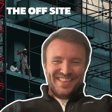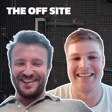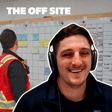Become a Creator today!Start creating today - Share your story with the world!
Start for free
00:00:00
00:00:01

Document Crunch CEO Shares Top Construction Contract Insights
This week Jason and Carlos are joined by the CEO of Document Crunch, Josh Levy to talk about contracts in construction and his vision for the company. Before that conversation, the duo:
1. Celebrate the Thames Tideway tunnel beginning operation.
2. Discuss whether there is a solution to the current business model in construction off the back of ISG's collapse.
Follow Carlos on Linkedin | Follow Jason on Linkedin | Check out Aphex
Transcript
Project Investment and Risks
00:00:00
Speaker
i mean We spent a ton of money on that, but we've just accepted, in exchange for that investment, that we're still going to lose. and I don't know of what p what rating podcast is. We're pay Carlos to quantity survey. We're going to pay Josh to legal.
00:00:18
Speaker
do this shit and we're still gonna lose we're still gonna lose a lot of money because we're just like well we baked into our budget that it's risky so fee erosion or costs like like waste it's all just accepted what the hell are we doing
00:00:41
Speaker
Welcome back to the podcast.
Thames Tideway Tunnel and Industry Updates
00:00:43
Speaker
We've got some pretty meaty topics to dive into today. So first we're going to kick off with Thames Tideway Sewer Tunnel in London becoming operational eight years after construction began. And then we're going to dive into the controversial discussion around the competitiveness and profitability in the construction industry ah in the wake of yet another sort of tier one contractor insolvency with ISG. And then we are gonna be joined by the CEO of DocumentCrunch, Josh Levy, to talk about their recent $21 million dollar series B raise. And to kick things off, I'm joined with, joined with, joined by co-host with the most, Karloth. How are you, mate?
00:01:33
Speaker
Pretty good, thanks. Pretty good. I've got a big boot um my on my leg. Spent a birthday evening in A&E getting an X-ray, so yeah. And how's the dog? The dog.
00:01:49
Speaker
That was like there a kicking dog joke. That was a little- But the cogs in my frame were starting slowly there. That was like, oh ah the dog's fine. He's solid.
00:02:02
Speaker
You know those things where they, you know the videos where they always get like the apprentice on the construction site and they pretend they're like kicking like a little football or something, but it's actually like a, like a welded on piece of steel. You had that with your dog.
00:02:15
Speaker
If you thought you're going to kick your dog and it was actually like a metal statue or something of a dog. Yeah. I saw this video the other day and it was like someone on a construction site landed at like lined up for cans and then each thing. Yeah. Yeah. The players thought there's a piece of rebar under the cab. Horrible. but Anyway, that's it. that That's, uh, that's, um, apprentice hazing videos that you've stumbled across there.
00:02:43
Speaker
Yeah. It's about when you get to that video, you're like, I should go to sleep now. ah Yeah. Yeah. Yeah. do scar egg ah you a said Very good. Right. Oh,
Thames Tideway Tunnel Milestone
00:02:53
Speaker
let's dive into it. So, uh, starting off in the UK. God, that makes me feel old. Uh, I interviewed on this project, Thames, Tideway tunnel has become operational.
00:03:04
Speaker
The valves at the first four sites have been opened and while the rest or yeah the remainder of the 25 kilometer long sewer tunnel isn't yet operational, it's going to increasingly happen over the coming months. It's already had a benefit ah with a rain event on the 23rd of September.
00:03:25
Speaker
It handled, I can't i couldn't believe this number, 589,000 cubic meters of sewerage ah water was captured in those first connections alone. And to be clear, that's 589,000 cubic meters of kind of gray water that would have ended up in the Thames.
00:03:45
Speaker
It's hard to visualize that we need a, we need another stat. Well, if I know someone that'll have some stats, if I know some of the live stats, Carlos, so take it away. Let's chart that number out again. Five, 589,000 cubic meters. What are we going to do it in? Are we going to do it in shards again? will pause well Is this football field? Swimming falls. It's got to be swimming falls.
00:04:14
Speaker
I did. Oh, this is, this is tough to listen to now. I don't know why. He tried to divide it by a hundred. Well, Oli will play some holding music over the top of this. What Carlos works out? What? five hundred day oh i means Yeah, I need to convert. If I start, if I start searching now and beat you.
00:04:33
Speaker
you
00:04:36
Speaker
It's 235 swimming pools. Oh, you beat me. That's so bad. I started it out six days after you did. And yeah it's like 10pm here.
00:04:51
Speaker
That's a lot. Okay. We got that. Cool. Any other facts you want to kind of elaborate on or just, yeah, that's actually a lot of water. but that's ah That's pretty impressive. And it's obviously only a section of the scheme too. I think also a couple of quite impressive shout outs. I think the original completion date was 2025 when it started in 2016. So they've been pretty good at holding that program.
00:05:14
Speaker
um So yeah, no major delays on what is actually quite a complex scheme, which involves TBMs, shafts. I don't know how many sites across London, something like 26, so lots of moving parts.
Success Factors of the Thames Tideway Tunnel
00:05:27
Speaker
Yeah, in the center of London. Yeah, you see the dots along the tabs, right?
00:05:33
Speaker
Yeah, yeah, 100%. You've got title conditions, you've got obviously the congestion of London, pretty much on time, really impressive. um And I guess fairly one that isn't aware, it was split into three sort of main contracts. So in the in the west, there was Balfour, Morgan, Sindel, and BAM, Ferrovio and Langarok in the middle, and then Costa and Vinci Basci on the other side. So yeah, um they must have actually worked together well too, to make sure that it wasn't delayed overall, in theory.
00:06:01
Speaker
They must have been using some ah one hell of a planning platform to make that happen. um the the but all serious ah the The thing that shocked me the most about this project over the years.
00:06:14
Speaker
is it's like, it's a, it's a well in trillion mega project. The original budget was 4.2 billion pounds. What has shocked me in contrast to almost all other mega projects you ever hear of is the current forecast act turn cost, I think is at 4.5 billion. So from 4.2 to 4.5 and it's now kind of operating that is That is outlier in a good way. um So yeah, wild. ah Really yeah hats off to the that that project, the team. Just 25,000 people had worked on the project over the preceding eight years.
00:06:54
Speaker
notes it's absolutely massive even with the tunnel itself so it's a seven meter diameter tunnel like it's not your typical train yeah um yeah yeah pipe but um the the lowest train pipe oh you said drain pipe i think you i think it's a train hit pipe Like those crosshair train pipes we did. um yeah the yeah So there's a section of it that went 70 metres below surface level. And for context, I think but the deepest tube line is like 50. I think you're going to do that. So it's not exactly... Pause your 45 minutes while you work out how many swimming pools that is.
00:07:32
Speaker
I don't know how deep of a living size football is, but yeah. um no say like it's it's Engineering wise, it's complicated. It's in a congested city. You've got all sorts of conditions to deal with. You've got the muck away job alone from central London. there's There's a lot of heavy moving parts. It's a serious engineering job but and they're pretty much on time and on budget. So yeah, hats off, a well run scheme.
Environmental Impact of the Super Sewer
00:07:58
Speaker
And so for those that don't know that are not in the UK, so this is a super sewer that's running essentially along the length of the Thames. The Thames historically ah has been the lucky recipient of a combination of sewer and stormwater and heavy rain events from the whole of a large part of London um and is therefore not the nicest body of water that you want to go in or near.
00:08:25
Speaker
And so this super sewer has a whole bunch of these collection points, the overflow ah spots for the existence storage system, puts it into a tunnel, pumps it up to a treatment plant. Is that plumbstead, I think from memory? yeah And so the magic question here, Carlos, before we kind of move on, um after we kind of congratulate the teams working on it, the magic question is, how long until you go swimming in the Thames?
00:08:53
Speaker
So i I heard a rumor, so no one can quote me on this, but there will be sections of the Thames that on a good day, which assuming like there's not a load of silt because it's quite rough water, it'll actually be clear you'll be able to see fish. So they've got like this vision of people kayaking, canoeing and something that doesn't look like toilet water. So yeah. how how long How long until it's like had enough cycles of the clean thing until you're ready to get in there?
00:09:21
Speaker
I'm not going again and in my lifetime, but we'll see. I'd imagine it would take some time to really clean it up. But the fact that we're not dumping sewage in on a regular basis, like ah a huge one. Yeah. the The fact that that tunnel is like operationalised is like a tremendous thing and also a totally gross thought to think of the first time that that tunnel had 589,000 cubic metres of Shit, what a Florida. Anyway, we'll stop there and jump onto the next topic. Jumping to something slightly more
Challenges in the Construction Industry
00:09:51
Speaker
serious. So I think we've probably referenced this in a couple of previous conversations, but
00:09:57
Speaker
over Over the years across most of the markets, especially in the UK in more recent years, there's been a number of ah major construction insolvencies, the latest being is ISG, which was I think a top five contractor ah just a couple of weeks back. In the wake of the news, there's been a lot of talk in the news on social media about the frustration about the way the construction industry operates. And I guess there's been a lot of voices talking about the need for some sort of change as nonspecific as that sounds. um I guess the question that probably is out there though is like, is what can change? Is there anything that can change? Is this something this is this business as normal for this industry? um Carlos, I guess with your background being all things numbers and construction profit, I'd be interested in what you think to start in terms of
00:10:57
Speaker
Yeah, is this is this business as normal or or is there something that needs to and has to change? Yeah, it's um so there's this spectrum of like the different risks and that the the clear obvious um issues associated with construction from like tech procurement through to cashflow and risk and everything else. The one that I always found hit quite hard was not just the risk on that the contractor takes on from the client, the risk that most contractors subcontract out their works, very few sort of self-deliver entire schemes. Having gone through the process myself, when you take a contract and then you dish it out to those below, we don't really have a true, accurate sort of measure of, I guess the words exposure.
00:11:45
Speaker
When you slice and dice something and spread it out there's always like bits of scope you forgot or you didn't cover or it wasn't clear in the works information and that's like the physical scope which is the easiest thing to slice and dice because especially with like a model now it's you can have quite clear sort of boundaries as to what a stub contractor is not just pricing but taking on the risk of so I Think it's really difficult to understand holistically um that exposure at a project level, let alone at a company level, because you've got on one end of the spectrum, you've got insurance and liability and and what they're actually covered for and everything else that comes with that to simple things like works information or like ability to provide resources and everything else that comes with a member of the supply chain. And if you actually
00:12:39
Speaker
If all of that was properly captured and understood, which is super difficult, you could probably have quite a good understanding about what you're actually letting yourself in for. and I feel like this is the intro of an ad for document consciousness. Well, not even a document point of view. A document's part of it. But but the commercials, the like the insurance, the the actual scope of works, it's not like there's so many gaps. So part of me thinks with these large contracts should actually the client, and we see this in some schemes, hold the commercial relationship with some of the supply chain member rather than it being sort of this tiered approach. So the client still holds some of that risk. But maybe that's a biased view towards protecting the contractor when the contractors are the one that are bidding for the job.
00:13:29
Speaker
Yeah, I think I think you're pointing at one of the things that makes it easy to lose money on a project,
Competitive Forces in Construction
00:13:38
Speaker
basically. Yeah. um I think when you think about the construction industry, there's like, everyone always says that it's high risk, low margin business, right? um and And that's, that's fairly well understood. I think one of the things that Anyone that's done it an MBA or studied business at some levels probably come across this model of these five forces. So there's a Harvard a professor. He wrote this paper around the five forces. It allows you to kind of analyze an industry.
00:14:09
Speaker
for its competitiveness and usually high competition equals low margin um because the margin is being competed away. And so the five forces were essentially the the competition in the marketplace. So in your peer set, so how much competition is there, how much power do the suppliers have? So that's a ah level of concentration or specialism that they have over um you So if you have less suppliers to choose from, they hold a lot of power over you. How much power did a buyer have? Do the buyers have? So if there's lots of contractors competing for the work from a small number of potential buyers, then again, there's a lot of power with the buyer. How much is there a threat of substitution? So if you don't do the work, how easy it is for someone else to come in and then do the work? ah How high is the threat of a new entrant? Or the opposite of that is how low is the barrier to entry?
00:15:00
Speaker
And when you look at the construction industry, it it varies depending on whether you're looking in the smaller side of projects or the larger size.
00:15:12
Speaker
But to to cut a long story short, it's a mega competitive industry. And even on the higher end of project size where your competition is lower because of the financial requirements to do it, you still end up with and you end up with an increasing concentration of buyers. So there's a lot of buyer power.
00:15:33
Speaker
And you have relatively high threat of substitution. So if you don't do the job, there's another contractor that will do the job and there isn't like much of a lock-in, uh, that a contractor has. And so it's just, I think it's inherently a high risk, low margin business. Yeah. Just to, just to riff off the back of, just of what you were saying that like you end up with this naturally high risk, low margin business.
00:15:58
Speaker
with relatively like low defensibility and low margin. And then you couple that with the thing that you were talking about, which is this very like old school contract method where effectively people are playing like hide the cheese. Like, where's the risk? It's like paired in this contract or over in this contract. We hope it's not in our one, you know? um
00:16:22
Speaker
It's, yeah, you're gonna, you're going to get caught at some point with a project that does blow up on you. And so the contractor has to somehow account for in their financial model, the resilience to handle some number or some amount of that. You know, that's, that's kind of a risk management thing that is very hard to forecast. It's interesting when you said, um, it's about like the the lowest number to do the job.
Impact of Low Bid Prices
00:16:52
Speaker
I think one of the issues, and I haven't got much information to back this up on, but like it is generally felt, feels like lowest price wins, assuming the competency of the bidder. What we don't see, and maybe this is happening in like, I dunno, data centers and other parts of industry that are actually funded by sort of technology companies and things like that. But if you're putting in a bid with a higher margin, with a higher cost, with something, some sort of, uh,
00:17:22
Speaker
like USP or method or something which actually would improve like the performance of the asset or the out at at the other end or um something substantial during construction. They're probably not being picked. So we're not really incentivizing anyone to do anything more than get in the cheapest number and the shortest program. And as long as you've got a track where record of delivering jobs, you're going to get it. So there's there is the competition element. But I don't think it doesn't seem like there's much appetite for incentivizing yeah real innovation rather than like innovation being we've used an app for this thing now which is like classic yeah but it's it's just it's not something that's like durable innovation because if you do something unique on your project if it is successful you don't own it any other any other contract would do the same thing because you've got the same people floating between all these companies so it's like it's
00:18:13
Speaker
Like people is part of their asset base, but it's not really because those people will move to other contractors. The only way that you increase your margin as an individual player in the market is to have something that is kind of like uniquely unique to you that others cannot easily copy. um And yeah, you end up basically with like this winner's curse where the person that wins the job is the one that's inevitably bid the lowest um and is carrying the most amount of risk.
00:18:43
Speaker
And it's it's interesting because that idea of needing as a contractor to account for the have a ah financial model that allows you to withstand the probably inevitable cost overruns on some number of projects.
Financial Resilience in Construction
00:18:58
Speaker
is probably why the like contractor as part of a conglomerate company or an asset owner company like ah like a Vinci or like ah where a contractor is one part of the wider business is such a compelling model at the very large scale of project because you've got that asset base and revenue base that means if you have a $200, $300 million dollars blowout, well, you've got you can borrow money against the assets.
00:19:26
Speaker
so that you're not at an instability risk. You've got so many contractors doing millions of revenue and the only asset is 50 million quid in the bank. That calculation is pretty garbage. Having that asset that is hedging your bets effectively is a much safer place to be it seems.
00:19:47
Speaker
Yeah, and and that's part of why I think in the history of the Australian market, you see so much consolidation of like what were the biggest all kind of ah consolidating that have some bad projects that would get into a financially in stable spot. And someone would buy another one at like bargain base and price and and scoop them up.
00:20:06
Speaker
And then you end up with the only way to compete with that is allow in international contractors into the market where they buy maybe a local contractor or they enter and then they use their financial wherewithal to to be the kind of to be to be the kind of backstop when it comes to um meeting the financial requirements to bid and do a sort of major project. There's lots of examples of Spanish, Italian,
00:20:34
Speaker
ah Malaysian contractors um entering so the Australian market because there's so little competition in that market um without them.
00:20:47
Speaker
So yeah, ah short answer is I don't know.
Comparative Industry Risks
00:20:50
Speaker
The the industry is high risk, low margin. I don't know any better solutions ah to change. I think that's like, and that's like the airline industry. It's like baked in. Yeah. It's it's really hard to see like a silver bullet type.
00:21:05
Speaker
shift. I think in a short term just actually understanding where you are at a point in time. Like imagine like on a project you've got the lag of knowing where your contracted program is at the end of the month. These companies are probably three months behind all actually knowing where they are across all their projects.
00:21:20
Speaker
say I said, if you're doing, you know, we're doing, we did an ad for document crunch and that one was for, that was for nodes and links. We're doing sponsored placements. If anyone doesn't know, we'll do sponsored placements. And we keep going, I'm going to i go to i' going to blame spreadsheets and whiteboards eventually.
00:21:43
Speaker
Same message every day. Yeah. Cool. No, uh, yeah, I don't think there's any, choices we don't think there's any solution. Cool. Why don't we jump on?
DocumentCrunch's Growth and Impact
00:21:55
Speaker
All right. So moving on. So a few bit weeks back, we were talking on the podcast about a new AI document, uh, contract review platform called document crunch, which Carlos and I unanimously agreed we would probably have bought and purchased in about two seconds. If we're still.
00:22:13
Speaker
working on projects. Well, in recent news, they've just raised another 21 odd million, um which ah is an outstanding effort. And we thought it'd be awesome and great to have Josh Levy, one of the founders join and chat to us. Josh, mate, thank you very much for making the time and thanks for chatting.
00:22:36
Speaker
Yeah, I appreciate you having me on. And I'd be remiss if I didn't say I'll still sell you some document crime subscriptions if you all want to. I'm happy to, ah you know, no, no problem. You guys can still buy. You got the right stuff. If you're ready, if you're selling straight away, you got the right stuff, mate. Perfect. How are you feeling, Josh? How are you feeling about the journey? So we're kind of talking a little bit about it off air. But how are you feeling about the journey so far on the mission ahead?
00:23:03
Speaker
Yeah, um it's funny. we We, you know, have a weekly newsletter. And so I told you all it's early morning here. I got up and wrote kind of my my part of our weekly newsletter to our internal team, The Crunchers. And what I would say is like, you know, there's been a lot of news that have come out about us over the last few weeks. And of course, there was a lot of effort that went into that in the months before the series B was preemptive. We didn't plan on raising it this year. um But you know, one thing led to another. So nothing like raising around kind of in secrecy, um while running the business, right, at least a year ago, when I was raising my series, I like carved out time to my schedule to go raise a Series A, but not not this. So anyway,
00:23:47
Speaker
It's been a bit of a recalibrating and and resettling week for me, right? I'm back home after a lot of travel that this week, like, as I told the team, embracing kind of the mundane of ah the home life and kind of renewing my focus a little. But the reason why I'm saying all this is to say that the main thing that I'm feeling right now is just so inspired to go win big. And the reason why is over the last week, we have, you know, two primary locations here in Atlanta, where I am. And then in Austin, Texas, where a lot of our product and engineering teams are, and we're kind of like really moving to hire in those two areas. And so I was in both locations last week as the news broke.
00:24:29
Speaker
um celebrating with our team. And you know, I'm literally you're you're literally getting read in to the letter that I'm sending to my company today. but They haven't even said straight off the dome. Yeah, perfect. Straight up straight off the dome. But you know, I got to be there. And I got to hear from just dozens of our team members, I could even get a little choked up talking about this right now.
00:24:53
Speaker
But to see the way that the crunchers are reacting to what Document Crunch means to them from a life experience standpoint, you know different reasons. Some people think that you know they're going to make a lot of money. Some people think that this is just the best environment that they've been in. Some people think this is going to be a huge resume builder. Whatever it is, like to hear from just dozens of individuals about what a meaningful Like experience, document crunch is for them. I'd be, you know gents, I'd be lying if I told you that I truly understood this. And this is literally like right from right to my company. um you know this this This kind of expanded my inspiration in that there's a growing group of human beings that are, you know feel that this could potentially be a pivotal or defining you know part of their life.
00:25:46
Speaker
And I am so freaking inspired to just go win and win big for all of these people that are doing all this amazing work and putting in their efforts and their hearts into what we're about. And, you know, I could even expand that to the customers. We call them like our crunch community, our partners. I mean, the support's been amazing, but I'm going to actually not do that for a minute. I'm going to just come back to the team of crunchers that we have here.
00:26:10
Speaker
And I just don't know, I would love to hear you what you both think, because you are both you know founders too. i would I did not know when I started this. I could have never reasonably envisioned the impact that this was going to have on like individual human beings. I know it's like cliche to talk about starting something. But when you look at these people in the eye, and they're getting choked up talking about like what this is for them,
00:26:39
Speaker
Man, it's just, it's incredibly inspiring. And that's, so I guess why my my big takeaway is the way, what I am feeling is hungry AF. I am hungry AF right now to go make sure that we realize our potential because there's a lot of human beings that I care about that are like knit to the quilt of what this is. And I just want it to be excellent and a great life experience for so many people.
00:27:10
Speaker
Yeah, definitely. The ah the like the impact that you that it has outside of the like business thing is something that I definitely underestimated. i was A couple of weeks ago, we ran ah an offsite for a whole bunch of our team and we had ah a whole bunch of people in Vietnam and ah there was sort of maybe 20 odd folks from the Philippines that came over from our team and met us there.
00:27:33
Speaker
And on the first evening, we're having this big meal and sitting around. And a couple of us were but talking and realized that most of these people hadn't left the country before. ah Some of them hadn't even had basil before in their life. And it was just like a little moment where you like realize that like yeah bit outside of the the work context and the professional goals and the growing of the company, that yeah you're able to have these little impacts on people's lives. And it's um yeah it's pretty special, man.
00:28:02
Speaker
you get those wholesome moments where founders, they start and they run, and you're just trying to not sink for so long. I don't think we're very good at looking back. So it's like those moments where you're like, oh shit, we actually have built something. We have got customers. We've got a team. um So no, that's that's awesome. um Obviously, there might be a lot of people here listening that haven't heard our previous episode, Josh. It'd be useful to hear like the the two minute pitch on what Document Crunch is.
Automating Contract Compliance
00:28:28
Speaker
um We got overexcited last time. I was a quantity surveyor for 10 years. And as soon as I saw this, I was like, oh shit, ah how many hours have I burnt doing this stuff manually? So um yeah, keen to get like the two minute elevator pitch, just so anyone listening does have a good idea what you're all about. Yeah, we're like a quantity surveyor's best friend, right? um Yeah, I mean, they don't have any friends. That's handy. That's good. You're a quantity surveyor's one friend.
00:28:55
Speaker
Look, I can't start in a two minute pitch without um talking about like the big picture. So $13 trillion dollar global ecosystem. You guys know that because we're in three different continents.
00:29:07
Speaker
The entire freaking industry is built on contracts. Contracts are as foundational to our industry as rebar is to a structure. what What do I mean by that? Every single workflow, every single job, every single project administrative issue, it all ties to the contract. And in a situation where 50% of projects are finishing over budget or over time, 50%, right?
00:29:31
Speaker
what the contract says and how the team administers it is everything, is everything. And ah we oftentimes overlook that, right? There's a lot of, ah you know, if thought that goes into, well, we should make sure that we have a fair contract. And that's all well and good. And you know this, because Carlos, you're a quantity surveyor. You would have paid me a lot of money in my former life to negotiate a fair contract for you. I'm a construction attorney. That's my background. Okay.
00:29:57
Speaker
But here's the deal. If I negotiate a good contract for you and it says that you get time and money, there's a rain delay because you live in the UK and it rains a lot there. But the team wearing hard hats doesn't ask the right way, doesn't send the notice the right way, isn't confident.
00:30:13
Speaker
in getting you know uh what to do when it rains guess what Carlos even though you pay me a lot of money to negotiate that fair contract for you you still are winning the sweepstakes of having to pay more than you thought you did when you sign up to build that project because 50% of the time it's going to be over budget and someone gets to win the sweepstakes of who pays so contract compliance both setting up the contract and in the field is critical. and Document Crunch is ensuring that across the entire project lifecycle, starting with making sure you have a fair contract, but certainly in helping the guys and ladies wearing hard hats every day, almost giving them a digital hard hat to ensure that they are not making critical mistakes across every workflow,
00:30:59
Speaker
is what we're all about. And that's what we're doing. So like to boil that down a little bit more, we're just ensuring best practices across the entire project lifecycle. We're doing that by automating jobs to be done. We're doing that by you know building a specific constructive, specific knowledge base. And we're just making this much easier. Again, like there was a time where construction was risky, and we just accepted that people could get injured on the job site. And then like we started handing out hard hats, and we're like, it's enough already.
00:31:27
Speaker
Well, what I believe Document Crunch really is, is like a digital hard hat. You're giving your folks a hard hat against one of the most dangerous parts of construction, which is contract compliance. And that's not just related to the actual boilerplate, but all the documents that relate to that, specifications, insurance policies, safety, you name it, right? We're making all of that compliance easy for our industry.
00:31:53
Speaker
Josh, that's great because ah if if you know anything about Carlos, he would have been the first quantity surveyor to disallow some cost or claim because the the notice or the letter wasn't sent. That's 100%. Of course. I mean, we i mean the the yankees the Yankees over here love that. I mean, you know a developer or a lawyer like me, we're going to put everything over you because we're going to squeeze every dollar that we can out of that project. And of course, that's the case, Jason. I mean, that's not what the whole industry has been built on. Jason and I have this ongoing ah we might call it an argument that sounds negative but this play on qs versus engineer and the importance i'm gonna call you every time now that we have that argument because it sounds like that's why you guys are both yeah you guys are both construction adjacent but but let me but but let let me let me let me put like even a finer point on it so here's the deal with that condition in my
00:32:45
Speaker
We spend a crap load of money on quantity surveyors like Carlos. We spend a crap load of money on lawyers like me. We spend a crap load of money on project administration, right? I mean, we spent a ton of money on that, but we've just accepted in exchange for that investment that we're still going to lose. And I don't know of what P, what rating we're work. We're going to, we're going to pay Carlos to quantity survey. We're going to pay Josh to legal.
00:33:14
Speaker
do this shit and we're still gonna lose we're still gonna lose a lot of money because we're just like well we baked into our budget that it's risky so fee erosion or costs like like waste it's all just accepted What the hell are we doing? What are we doing? What if we didn't need to invest A, as much in these resources and B, we didn't have to take on as much risk because we didn't have this shoot in our foot type of moments arising on the job site.
Field Team Support with DocumentCrunch
00:33:44
Speaker
car I don't care how many Carlos's you have or how many Josh's you have. They cannot live in every single project trailer on every single decision, every single day.
00:33:53
Speaker
We can provide a more ubiquitous and better approach to protecting the industry from screwing itself. And so when something bad happens, or something, I shouldn't even say something bad happens. When something inevitably happens on a job site that changes the cost over time, we want to create a very clear record of what the entitlement is and who did what.
00:34:15
Speaker
Who did what to gain the entitlement? What's the law of the project? And who has ah adhered by the law? And if we do that, you're going to reduce all this crap, all of this over investment, all this litigation. And we're talking, I mean, billions, if not trillions of dollars in our industry.
00:34:35
Speaker
So Josh, ah like i'm I'm a product guy. So I've heard ah you and I think maybe some of the your investors in the Series B or in earlier rounds talk about this idea of ah taking this right down to the field, to the to the folks in the field and making them aware and able to like uncover the right entitlement or action that they need to take. From ah from a product perspective, what what What does that look like? What is the kind of vision of how far that goes and and and how ah and and what are the interactions for the the people in the field if someone's trying to imagine the future?
00:35:13
Speaker
Yeah, well, the the future is here now, Jason. I mean, we'll we'll have we'll have to you'll have to have me back on in early 25. We're going to be making some major, major announcements with regard to the product and stuff. um But all that to be said, that is what spurred the Series B. I mean, look, we started as like what I would call more of just a, hey, people were using us. like Where we got popular,
00:35:37
Speaker
was people were using less to assess risks in contract and But my vision always was, going back to kind of my founding story, like I was heads down doing all this legal work, but I'd have a line of people outside my office every day, hard hat in one hand, piece of paper on the other hand, something happened on the job site and they needed help. And I was like, oh, shit, if they're in my office, we're definitely losing money for a lot of reasons. But like them not resolving this in the trailer, like quickly,
00:36:04
Speaker
is like already like the meters on right ah anyway like just how much how much are we gonna lose now how much profit is now coming out of the bottom lines the theory always was to to kind of get multi-product and to move further into the field workflows so we started launching the first few ah jobs to be done to support project teams in uh like second half of last year and right through our series a And that's why we raised our Series A. So I don't know if you saw that we announced this major partnership with Procore in April. And like, boom, it's taken off like wildfire, thousands of projects, just like you guys were talking about a few weeks ago in your podcast. All these folks in the field are like, wait,
00:36:45
Speaker
You can now make this like easier for me. You can help me make heads and tails of this. So the way the the the original product that was focused toward the field is what's called the Project Team Playbook. Hey, like, okay, so let's talk best practices through this framework. Best practice number one, you should understand the risk in your contract before you bid a job. Carlos, that sounds probably familiar to you. I know that sounds crazy, but like there's not a lot of quantity surveyors here in the US that are making sure that's happening operationally.
00:37:13
Speaker
number Number two, once you're awarded the job, you should negotiate the contract up to your risk profile. Carlos, that probably sounds familiar to you too. That's where we started. That's what we were popular for. But number three, like we just started with this. Here's what I believe guys, ready for this? It is a best practice that once you've signed the contract,
00:37:32
Speaker
the people in the field should understand like the rules of engagement. They don't need to know all the legal crap, where we're arbitrating, what the attorney's fees are. That's an American concept. They don't need to know all that stuff. They do need to know what to do when it rains. They do need to know what the critical milestones are. They do need to know you know what the right retainage is.
00:37:54
Speaker
And so the first thing that we launched was this automated playbook for project teams. Like the thing that I wish that I could have given project teams at the onset, right? But now we're moving deeper and deeper. In fact, I'll share with you some news. I mean, we're launching it this week. We're now automating contractually compliant notices for project teams. That's launching live this week for general availability. And so anyway, the point is is that we'll start automating more and more jobs to be done for project teams.
00:38:21
Speaker
um So that when they're looking at a payment app or they need to give notice or whatever, whatever, whatever, they're doing it the right way and with full working knowledge of what you know is going on. It could be as simple as, I mean, we're already here, right? We've got like the equivalent of you know a chat functionality. Superintendents walk in the job site.
00:38:43
Speaker
Concrete's about to be poured. Someone's like, is that the right rebar? Well, what the F, guys? What's happening up until this day? You guys know, Carlos, even in the industry, what's that superintendent doing? Who knows? It's like 50-50. Whether we're like getting this right in real time or not, are we like stopping the poor to go do a legal research memorandum on this?
00:39:08
Speaker
You know, being able to to deliver just-in-time insights, being able to help automate some of these jobs to be done, being able to put this but like information right at people's fingertips. So when the owner is yelling at Carlos in the job trailer about what the allowable markup is, Carlos isn't just like putting his tail between his legs because he's not sure and signing something. Carlos is able to say, well, hold on a second.
00:39:32
Speaker
What are you talking about? This is like clearly entitled, why don't you sign this thing and let's like move forward. So that's what this is all about. This is about following project teams like an angel on their shoulder throughout every workflow that they go through every day so that we can make sure that they're making optimal decisions and then automating some of those decisions for them.
Balancing Automation and Accountability
00:39:50
Speaker
Yeah, so I think when we were talking the other day or when we talked about this on the, on the podcast and even offline afterwards, Carlos and I were going back and forth about how many projects where we had 3000, 2000, 4000 page contracts.
00:40:05
Speaker
when you have zero visibility of the rights and obligations in there and you just try to like find one clause somewhere and hopefully hang your hat on that. and don't and So that where you're preaching to the you're preaching to the choir, Josh. the um I think the you said something earlier about how like the whole industry is built on contracts, you know hints in the name, they're called contractors. um the they definitely know their They definitely know their way around um litigation and contracts. how do you How do you ah square or how do you answer the question of ah legal liability regarding kind of perceived advice with the kind of giving advice or making decisions and as you go further and further down that path?
00:40:55
Speaker
Yeah, it's a really great question, Jason. So like let me ask you a question here. um how do I'll ask a rhetorical question. How do these construction companies deal with giving legal advice or making recommendations when these folks in the field are engaging with this unsupervised every day anyway?
00:41:13
Speaker
Yeah, it's me being a, boy go we used to call ourselves Bush lawyers. but Where you get the engineers. Bush lawyers. I love it. I've never heard that before, but like, look, here's the deal. We're not trying to give advice. We're not trying to replace the need for legal, but we are trying to fill a gap.
00:41:32
Speaker
that does exist, which is to make some of this easier and easier to understand. So ah we we are not trying to become the lawyer. I would say that what we're really trying to become is like a supercharged quantity surveyor or project administration assistant or something along those lines. But of course, as you know, like there's folks in the field that are making these own recommendations every day with zero qualifications to do so, right? So this is just to supplement decision-making, but it's not to ah replace the need for appropriate counsel. And in fact, by making this easier to understand what we're actually seeing, what our customers will tell you is actually teams are more aware of when they should engage to get the appropriate advice because this becomes like something that's like
00:42:22
Speaker
not something that we should just render a decision on. So ah definitely not trying to replace the legal side, but definitely trying to fill gaps around all the decisions that are taking place with zero legal input or zero oversight on a daily basis. yeah and So we're never gonna we're never we're never gonna tell you, you should sign the contract because we think it's fair.
00:42:46
Speaker
We're never going to tell you. We are going to tell you, here are the issues in the contract that, you know, we think are standard issues in the contract. And here's what your company says about those issues. Here's what your company's advice is on those issues. Here's how your company approach approaches those issues. Of course, we have some perspective off the shelf, but we're not trying to give advice.
00:43:11
Speaker
Is there a line there around the generative side? You were talking about compliant notices. Josh, is that is there, is that starting to ah kind of take it? Is that you get into slightly different area on the generative side? I guess, but then I would guess like the same line would exist for a lawyer like using the internet.
00:43:29
Speaker
um like like you know is there a line like if you're using the internet to do a task let's just play with that like is there a line like at what point do you need to interact with the internet to ensure that the internet is doing the right thing so i guess my point is yes there's a line jason but there's a line in every single piece of software that you use which is to say that document crunch is not trying to be a total replacement the document crunch is trying to greatly enhance your performance around these tasks. You, you the human, are still responsible to ins ensure that things are done the right way. Like, is it fair that an engineer is it fair that an engineer says I used a calculator, therefore I have no liability for my calculations? Hell no.
00:44:18
Speaker
it's the engineers writing It's the engineers writing the letters that we have to be worried about, because that's what I, it's those push lawyers that are writing those letters. yeah but but but but but But my point being, okay, great. Engineers can use a calculator now. They don't have to do all their math by hand, but they're still responsible for the ultimate result of that calculator. They don't get to say, I use a calculator, therefore I have no liability or I have no responsibility to make sure that I got the load calc right. That doesn't make sense.
00:44:48
Speaker
Yeah, 100%. It's a UI issue. We do not want to be a total replacement for all human worth, but we do certainly want to supplement the hell out of it and automate the parts of it that don't necessarily need full human interaction.
00:45:03
Speaker
it feel It feels like this is a question that every company using any form of AI is going to get a lot now. And then eventually they'll just stop getting asked it because it'll become kind of how the, it'll become kind of commonplace.
Global Expansion of DocumentCrunch
00:45:15
Speaker
Carlos, you were going to ask that, right? It's like, if you ask your commercial manager something, you don't take that as legal little advice. It's just handy to know and be prompted. No, there's this part that keeps looping around in my head. And a couple of days ago, I was at a ah like a tier one contracted conference and part of it they were talking about the planning team pulling together 100 page guidance notes on forms of contracts specifically around planning.
00:45:41
Speaker
um So no contractors, if you return like a clause or some information, it's that straight shooting. It's quite ambiguous a lot of times. So is there, do you see getting into a space, I know you said it's not legal advice, but um providing feedback based on industry use of contracts to like point people in the right direction based on history? We already do.
00:46:05
Speaker
ah we already yeah So again, is that advice or is that data driven? I think it's the latter. I know it's the latter, right? And so like, for example, we're working with the National Electrical Contractors Association here. We've been working with them for years. They have a research and an innovation arm called Electri.
00:46:22
Speaker
We have, I think, 40 chapters that now subscribe to Document Crunch every day. But here's the cool thing that we're doing. When those members are using our product, we're now able to say, OK, here's your indemnity. Here is what a lecturing views is like a good standard or a NICO views is a good standard for indemnity. X percent of your peers signed contracts with the good standard, why percent signed contracts with the okay standard based on the data that we have. And we're doing the same thing for organizations too, as we build out like essentially knowledge basis, like for those organizations. So absolutely Carlos, I mean that now you're getting to the heart of it. And why is that powerful?
00:47:01
Speaker
because we're actually, we're not so we're not being subjective about it like you would have paid some lawyer or somebody to render an opinion. We're actually starting to provide objective data to power decisions.
00:47:13
Speaker
Yeah, because ultimately, yeah you'd want to yeah you'd want to shoot for the contracts you do well in or the ones that are yeah most profitable and things like that at a high level. but that That is what we're building. I mean, that's what we're building from the industry, right? So we have like what we do off the shelf. And then we have what we do for our organizations and our organizations are able to bake in ah From day one, this was always my vision. And again, this goes back to my founding story. I represented in private practice all these tier one contractors. Here's the secret, right? A lot of them have similar policies, standards, and procedures that all of them want like little tweaks to it. So we created created a framework around best practices, what you do at various points in time. And now there are individual knowledge bases that are able to be baked into our platform. So that when you're looking at the hazardous abatement clause in a contract, you're able to say,
00:48:04
Speaker
Our company policy is to never sign a change order for hazardous abatement unless Jason in the in the safety department has been consulted and has verified that we can do this work. And that is what we're doing, which again, just allows best practices.
00:48:22
Speaker
Awesome. I'm getting the wind up from from our producer Olu Josh. So I have a very important question. So folks that might listen to this in the UK, Oz, Europe, and are thinking, shit, this sounds great. How can we have a go? How can we see a demo? One, is it available outside of US? And two, how where do they go? Who do they talk to?
00:48:43
Speaker
Yeah, what I would say is we're now working very strategically with an eye toward expansion into both the yeah UK and Australia in particular. um We are members of the HS2 accelerator right now helping solve some of their problems around digitizing work.
00:48:58
Speaker
I've got a bunch of crunchers headed out to the UK in November, and I'll probably be coming there half one of next year. I'll also be out in Australia probably half two of next year. um ah We have an eye toward expanding to both. We've definitely validated that this problem exists in both areas. ah Really the whole world. but those are Those are two focus areas, which is why I was excited. Folks can reach out to us.
00:49:20
Speaker
We're already working with folks in both places. ah I wouldn't say that like we're generally available in these areas yet, but we have some big overlapping customers that you all I think you'd mentioned like Balfour Beatty, for example, I mean, they're a big public customer of ours will be out, you know, ah we're we're happy and you know, pro core relationship, we're kind of going where our customers and our partners are pulling us.
00:49:42
Speaker
Um, and so, uh, just reach out to us. Uh, we will school you up right now if you've got a use case. I mean, the good news is these contract issues are really the same regardless of whether you're in the U S or the UK liquidated damages are important. Uh, You know, liability caps are important um no matter where you are. So yes, we are available and we'll be standing up more formal infrastructure in both jurisdictions over time. So just reach out to us. Our sales team would be happy to show you a demo. Our customer success team is going to be out there in in November as well. Awesome, mate. Thank you very much for making the time. Carlos, do you want to read us out, bud? Yeah, sorry. I was so engrossed in that. I forgot about my lines at the end. No, thank you.
00:50:23
Speaker
Josh, thank you very much for coming on and thank you very much everyone for tuning into today's show. um If you did enjoy the episode, please do think about liking the video or following us on your chosen podcast platform. ah We really do appreciate your support and we'll see you all next week. Bye bye.



















